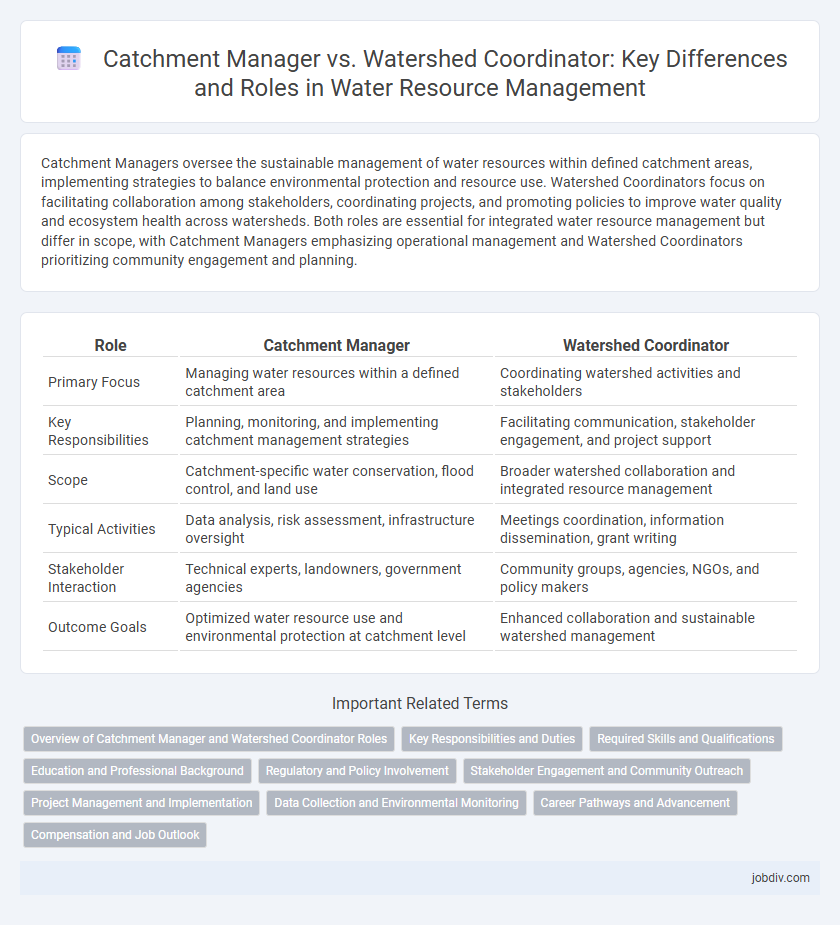Catchment Managers oversee the sustainable management of water resources within defined catchment areas, implementing strategies to balance environmental protection and resource use. Watershed Coordinators focus on facilitating collaboration among stakeholders, coordinating projects, and promoting policies to improve water quality and ecosystem health across watersheds. Both roles are essential for integrated water resource management but differ in scope, with Catchment Managers emphasizing operational management and Watershed Coordinators prioritizing community engagement and planning.
Table of Comparison
| Role | Catchment Manager | Watershed Coordinator |
|---|---|---|
| Primary Focus | Managing water resources within a defined catchment area | Coordinating watershed activities and stakeholders |
| Key Responsibilities | Planning, monitoring, and implementing catchment management strategies | Facilitating communication, stakeholder engagement, and project support |
| Scope | Catchment-specific water conservation, flood control, and land use | Broader watershed collaboration and integrated resource management |
| Typical Activities | Data analysis, risk assessment, infrastructure oversight | Meetings coordination, information dissemination, grant writing |
| Stakeholder Interaction | Technical experts, landowners, government agencies | Community groups, agencies, NGOs, and policy makers |
| Outcome Goals | Optimized water resource use and environmental protection at catchment level | Enhanced collaboration and sustainable watershed management |
Overview of Catchment Manager and Watershed Coordinator Roles
Catchment Managers oversee the planning, implementation, and monitoring of water resource projects within a defined catchment area, ensuring sustainable management of water quality and quantity. Watershed Coordinators facilitate collaboration among stakeholders, promote community engagement, and coordinate conservation efforts across the watershed to address local water-related challenges. Both roles are integral to integrated water resource management, with Catchment Managers focusing on technical and regulatory aspects, while Watershed Coordinators emphasize stakeholder involvement and outreach.
Key Responsibilities and Duties
Catchment Managers oversee land and water resource planning, implementing strategies to prevent erosion, improve water quality, and manage flood risks within a defined catchment area. Watershed Coordinators facilitate collaboration among stakeholders, coordinate conservation projects, and promote education to sustain watershed health and habitat protection. Both roles require expertise in hydrology, environmental regulations, and community engagement, but Catchment Managers focus more on technical resource management while Watershed Coordinators emphasize stakeholder coordination and public outreach.
Required Skills and Qualifications
A Catchment Manager typically requires expertise in hydrology, environmental science, and project management with strong analytical and leadership skills to oversee water resource planning and implementation. A Watershed Coordinator usually needs qualifications in environmental policy, community engagement, and conflict resolution, emphasizing communication and collaboration abilities to coordinate stakeholders effectively. Both roles demand proficiency in GIS technology, regulatory compliance knowledge, and experience in sustainable water management practices.
Education and Professional Background
Catchment Managers typically possess degrees in environmental science, hydrology, or civil engineering, with professional experience in water resource management and land use planning. Watershed Coordinators often have backgrounds in natural resource management, ecology, or environmental policy, coupled with skills in community engagement and stakeholder collaboration. Both roles require expertise in watershed science, but Catchment Managers focus more on technical and regulatory aspects, while Watershed Coordinators emphasize education and outreach for sustainable water practices.
Regulatory and Policy Involvement
Catchment Managers typically engage in regulatory compliance, ensuring water quality standards and land-use policies align with environmental protection laws. Watershed Coordinators focus on facilitating stakeholder collaboration and implementing policy initiatives that support integrated watershed management goals. Both roles contribute to sustainable water resource governance but differ in emphasis on enforcement versus community-driven policy advocacy.
Stakeholder Engagement and Community Outreach
Catchment Managers typically focus on coordinating agricultural, industrial, and municipal stakeholders to implement water quality and land management practices across specific catchment areas. Watershed Coordinators emphasize community outreach by facilitating public participation, education, and stakeholder collaboration to address watershed-wide environmental concerns. Both roles require strong stakeholder engagement skills but differ in scale and approach, with Catchment Managers targeting resource management and Watershed Coordinators fostering broader community-driven initiatives.
Project Management and Implementation
Catchment Managers oversee the planning and execution of water resource projects, ensuring sustainable usage and regulatory compliance within specific catchment areas. Watershed Coordinators facilitate collaboration among stakeholders, coordinate community engagement, and support the practical implementation of conservation initiatives. Both roles require expertise in project management, but Catchment Managers focus more on strategic oversight while Watershed Coordinators emphasize operational execution and stakeholder communication.
Data Collection and Environmental Monitoring
Catchment Managers specialize in overseeing data collection related to soil erosion, runoff patterns, and water quality within specific catchment areas, using advanced monitoring technologies to optimize land and water resource management. Watershed Coordinators focus on coordinating community-based environmental monitoring programs, integrating citizen science data with professional datasets to track watershed health indicators such as pollutant levels, biodiversity, and habitat conditions. Both roles utilize geographic information systems (GIS) and remote sensing data to support sustainable water management and inform policy decisions.
Career Pathways and Advancement
Catchment Managers typically advance through roles involving integrated water resource management, focusing on policy implementation, stakeholder coordination, and environmental compliance, often requiring degrees in environmental science or hydrology. Watershed Coordinators progress by specializing in field data collection, community engagement, and habitat restoration projects, with career growth linked to certifications in watershed management and environmental planning. Both career pathways offer opportunities in governmental agencies, non-profits, and consulting firms, where expertise in GIS, water quality assessment, and sustainable land-use practices enhances advancement potential.
Compensation and Job Outlook
Catchment Managers typically receive higher compensation than Watershed Coordinators, with average salaries ranging from $60,000 to $90,000 annually based on qualifications and geographic region. Job outlook for both roles is positive due to increasing demand for sustainable water management, though Catchment Managers often have more opportunities in government agencies and environmental consulting firms. Watershed Coordinators frequently work within non-profits and local community organizations, where positions may offer lower pay but greater community engagement and project diversity.
Catchment Manager vs Watershed Coordinator Infographic

 jobdiv.com
jobdiv.com